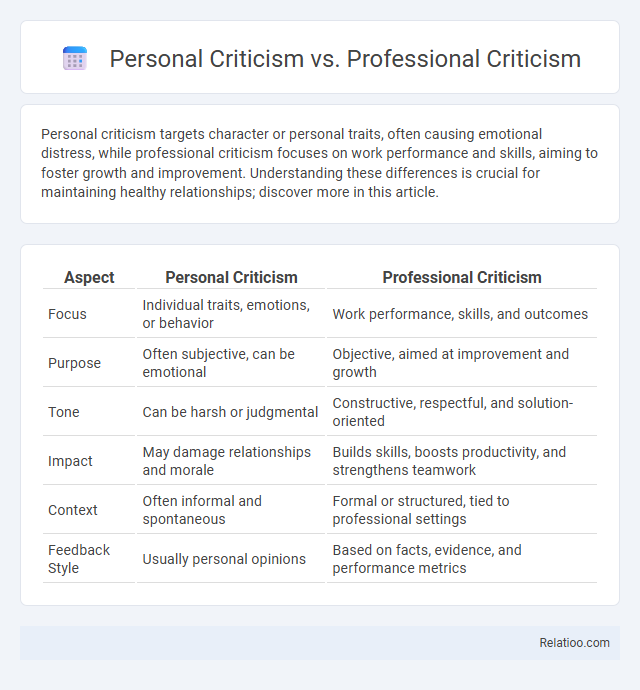Personal criticism targets character or personal traits, often causing emotional distress, while professional criticism focuses on work performance and skills, aiming to foster growth and improvement. Understanding these differences is crucial for maintaining healthy relationships; discover more in this article.
Table of Comparison
| Aspect | Personal Criticism | Professional Criticism |
|---|---|---|
| Focus | Individual traits, emotions, or behavior | Work performance, skills, and outcomes |
| Purpose | Often subjective, can be emotional | Objective, aimed at improvement and growth |
| Tone | Can be harsh or judgmental | Constructive, respectful, and solution-oriented |
| Impact | May damage relationships and morale | Builds skills, boosts productivity, and strengthens teamwork |
| Context | Often informal and spontaneous | Formal or structured, tied to professional settings |
| Feedback Style | Usually personal opinions | Based on facts, evidence, and performance metrics |
Understanding Personal Criticism
Personal criticism targets an individual's character or personality, often impacting emotions and self-esteem, unlike professional criticism which focuses on job performance or skills. Understanding personal criticism helps you differentiate between constructive feedback and attacks on your identity, enabling better emotional resilience. Recognizing this distinction improves your ability to respond effectively and grow from feedback without feeling personally attacked.
Defining Professional Criticism
Professional criticism involves providing constructive, objective feedback aimed at improving skills or outcomes within a workplace or industry context. Unlike personal criticism, which targets individual traits or behaviors, professional criticism focuses on specific work-related actions and results, maintaining respect and fostering growth. Understanding the difference helps you receive critiques that enhance your performance without affecting your personal self-esteem.
Key Differences Between Personal and Professional Criticism
Personal criticism targets an individual's character or behavior, often perceived as subjective and emotionally charged, whereas professional criticism focuses on work performance, skills, or outcomes, maintaining objectivity and constructive intentions. The key difference lies in personal criticism affecting self-esteem and relationships, while professional criticism aims to improve job effectiveness and foster growth. Understanding these distinctions helps manage responses and apply feedback effectively across personal and workplace contexts.
The Impact of Personal Criticism on Relationships
Personal criticism often targets individual traits or behaviors, which can create tension and damage trust in relationships, unlike professional criticism that focuses on work-related performance and improvement. Your emotional response to personal criticism can lead to misunderstandings and conflict, making it harder to maintain healthy communication. Recognizing the difference between constructive feedback and personal attacks is crucial for preserving strong personal and professional relationships.
How Professional Criticism Fuels Growth
Professional criticism provides specific, actionable feedback rooted in expertise, allowing you to identify areas of improvement and enhance skills effectively. Unlike personal criticism, which often targets individual traits, professional criticism focuses on performance and outcomes, fostering a constructive environment for learning and development. Embracing professional criticism accelerates your growth by transforming challenges into opportunities for mastery and innovation.
Identifying Personal Attacks in Feedback
Personal criticism targets an individual's character or traits, often manifesting as subjective and emotionally charged remarks, while professional criticism focuses on specific behaviors, actions, or work outcomes aimed at improvement. Distinguishing personal attacks in feedback requires recognizing comments that undermine self-worth rather than addressing performance or skills constructively. Effective feedback separates personal identity from job performance, emphasizing actionable insights without resorting to derogatory or irrelevant personal judgments.
Strategies for Delivering Professional Criticism
Effective strategies for delivering professional criticism include focusing on specific behaviors rather than personal traits, ensuring the feedback is constructive and actionable, and maintaining a respectful tone to foster a positive working environment. Utilizing clear and objective language helps avoid misunderstandings, while framing criticism around shared goals promotes collaboration and improvement. Timing and setting are crucial; private, timely conversations enhance receptiveness and demonstrate respect for the recipient's feelings and professional growth.
Responding Effectively to Personal Criticism
Responding effectively to personal criticism requires maintaining emotional control and avoiding defensive reactions to safeguard professional relationships and personal well-being. Emphasizing constructive feedback helps differentiate personal criticism from professional criticism, which typically targets work performance or processes without attacking individual character. Developing active listening skills and seeking clarification can transform personal criticism into opportunities for growth and improved communication.
Turning Professional Criticism into Opportunity
Professional criticism offers specific, actionable feedback aimed at improving skills and performance, distinguishing it from personal criticism, which often targets individual traits and can feel subjective or unfair. By approaching professional criticism with a growth mindset, individuals can transform feedback into valuable opportunities for learning, development, and career advancement. Emphasizing constructive dialogue and focusing on measurable outcomes helps convert criticism into a strategic tool for continuous improvement.
Building a Culture of Constructive Feedback
Personal criticism targets individual traits or behaviors, often leading to defensiveness and reduced morale, impeding a culture of constructive feedback. Professional criticism centers on specific work-related actions or outcomes, promoting growth and skill development when delivered respectfully and with clear, actionable guidance. Emphasizing constructive feedback through professional criticism fosters trust, collaboration, and continuous improvement in organizational cultures.

Infographic: Personal Criticism vs Professional Criticism
 relatioo.com
relatioo.com